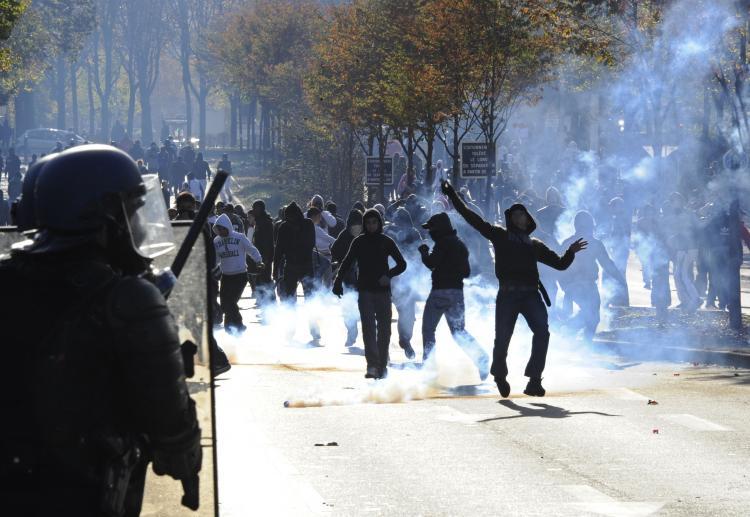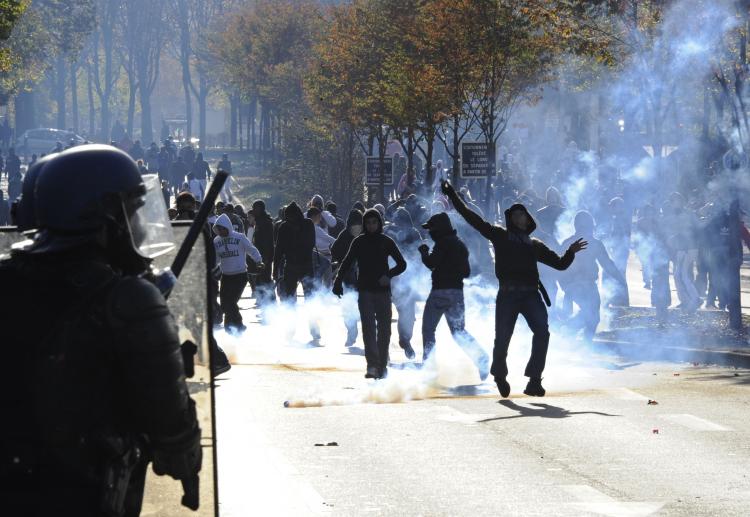PARIS—Some would call it union-backed economic terrorism, some a necessary strength to protect social welfare; yet no matter your angle, French strikers have once again shown on Tuesday, Oct. 19, the uniqueness of the methods of French labor unions and the way “social dialogue” is seen in France.
For the sixth day of national action in over a month against the reform of the French pension system, unions tried to increase pressure on the French government. The leftist opposition Socialist Party said this week would be crucial, given that the French Senate adopts the new law on Wednesday, Oct. 20, three days before the mid-autumn holidays.
On Tuesday, Oct. 19, as on the previous Tuesday, 1.2 million people marched in the streets of France’s main cities to protest and refuse a change of the legal age of retirement—currently set at 60 and planned to be changed to 62 as a way of guaranteeing the financial balance of the pension system.
For the last week, French unions have organized strikes at French petroleum refineries and fuel suppliers, creating major difficulties in transportation with a shortage of gasoline in more than 1,500 gas stations, where huge lines of cars were observed in the last few days.
Truck drivers have joined the movement and made the fuel refinery strikes worse by blocking access to fuel storage tanks in the western part of France—such as in the cities of Rouen and Caen—before French police used force to remove the blockade.
In Le Mans, a high school was totally destroyed by a criminal fire during the night of Monday, Oct. 18, only one hour after angry students had built barricades to prevent its opening the next day. In Lyon, cars were burned and several shops were destroyed during student protests.
Though fewer strikers may have been counted in the main sectors, such as public transportation, the movement has turned more radical in the last few days, making it the largest opposition movement in France in the last 15 years.
According to Brigitte Lestrade, a political researcher who compared labor unions in France and Germany for the IFRI (French Institute of International Relations), because French unions are not representative of French workers and are usually unable to agree with each other, they appear to be not adapted to the evolution of society. Lestrade cites polls indicating labor unions are perceived by workers as “useless, nonrepresentative, unable to reform themselves, and centered around their own interests.”
Given this situation, the force of French unions is to be explained, says Lestrade, by their “ability to mobilize public workers in repeated strikes, especially in public transportation. … They therefore enjoy means of action that cannot compare to their electoral power.” Their growing weakness in the post-industrial Western world is also compensated by conflict-oriented rather than dialogue-oriented approaches.
After Tuesday’s national mobilization, CGT issued a short statement saying: “The determination of opponents to the reform of the pension system definitely will not weaken. … The government and its majority in the Parliament bear a heavy responsibility in the tension that has grown everywhere in the country. When will they no longer stubbornly insist?”
Such faith in reform is, as of today, far from enough to convince the French public. The massive involvement of high school students is evidence that the real issue might not be the reform of the pension system, but the general public distrust suffered by Nicolas Sarkozy’s government. Because to put things plainly, 15- to 18-year-old teenagers simply don’t care about issues like the age of retirement. Yet what they usually deeply care about is a sense of justice and fairness in governing policies.
This is what the French government may have failed to demonstrate, especially with measures widely seen as favoring a small circle of people close to those in power, and with repeated accusations of conflict of interests and nepotism—the latest being accusations made against Labor Minister Eric Woerth in connection with the financing of Sarkozy’s 2007 presidential campaign: In this context, the reform of the pension system might simply be the last straw.
For the sixth day of national action in over a month against the reform of the French pension system, unions tried to increase pressure on the French government. The leftist opposition Socialist Party said this week would be crucial, given that the French Senate adopts the new law on Wednesday, Oct. 20, three days before the mid-autumn holidays.
On Tuesday, Oct. 19, as on the previous Tuesday, 1.2 million people marched in the streets of France’s main cities to protest and refuse a change of the legal age of retirement—currently set at 60 and planned to be changed to 62 as a way of guaranteeing the financial balance of the pension system.
For the last week, French unions have organized strikes at French petroleum refineries and fuel suppliers, creating major difficulties in transportation with a shortage of gasoline in more than 1,500 gas stations, where huge lines of cars were observed in the last few days.
Truck drivers have joined the movement and made the fuel refinery strikes worse by blocking access to fuel storage tanks in the western part of France—such as in the cities of Rouen and Caen—before French police used force to remove the blockade.
In Le Mans, a high school was totally destroyed by a criminal fire during the night of Monday, Oct. 18, only one hour after angry students had built barricades to prevent its opening the next day. In Lyon, cars were burned and several shops were destroyed during student protests.
Though fewer strikers may have been counted in the main sectors, such as public transportation, the movement has turned more radical in the last few days, making it the largest opposition movement in France in the last 15 years.
A Culture Of Conflict
The strong and radical implication of labor unions is nothing less than surprising: The culture of dialogue and preventions of social conflicts that is, for instance, seen in Germany, is nearly absent in France.
French unions face a sharp decline and only represent 8 percent of all workers, mostly state employees—this is the lowest rate of adhesion to unions in Europe. Additionally, most French labor unions harbor a strong political—rather than social—agenda. The largest labor union, CGT (General Confederation of Workers) is, for instance, a communist-affiliated movement that vows to compensate for the loss of influence of a nearly extinct French Communist Party.According to Brigitte Lestrade, a political researcher who compared labor unions in France and Germany for the IFRI (French Institute of International Relations), because French unions are not representative of French workers and are usually unable to agree with each other, they appear to be not adapted to the evolution of society. Lestrade cites polls indicating labor unions are perceived by workers as “useless, nonrepresentative, unable to reform themselves, and centered around their own interests.”
Given this situation, the force of French unions is to be explained, says Lestrade, by their “ability to mobilize public workers in repeated strikes, especially in public transportation. … They therefore enjoy means of action that cannot compare to their electoral power.” Their growing weakness in the post-industrial Western world is also compensated by conflict-oriented rather than dialogue-oriented approaches.
After Tuesday’s national mobilization, CGT issued a short statement saying: “The determination of opponents to the reform of the pension system definitely will not weaken. … The government and its majority in the Parliament bear a heavy responsibility in the tension that has grown everywhere in the country. When will they no longer stubbornly insist?”
Public Distrust
“We do listen, we can hear the expressed worries, but we also are decided to make it to the end because the reform is reasonable, fair, and absolutely necessary,” answered Prime Minister Francois Fillon.
“Nobody will step back on the age of retirement at 62, because it would be economically insane and would create social havoc. This makes you even guiltier in front of history,” added Fillon, talking to the French Socialist Party.Such faith in reform is, as of today, far from enough to convince the French public. The massive involvement of high school students is evidence that the real issue might not be the reform of the pension system, but the general public distrust suffered by Nicolas Sarkozy’s government. Because to put things plainly, 15- to 18-year-old teenagers simply don’t care about issues like the age of retirement. Yet what they usually deeply care about is a sense of justice and fairness in governing policies.
This is what the French government may have failed to demonstrate, especially with measures widely seen as favoring a small circle of people close to those in power, and with repeated accusations of conflict of interests and nepotism—the latest being accusations made against Labor Minister Eric Woerth in connection with the financing of Sarkozy’s 2007 presidential campaign: In this context, the reform of the pension system might simply be the last straw.







